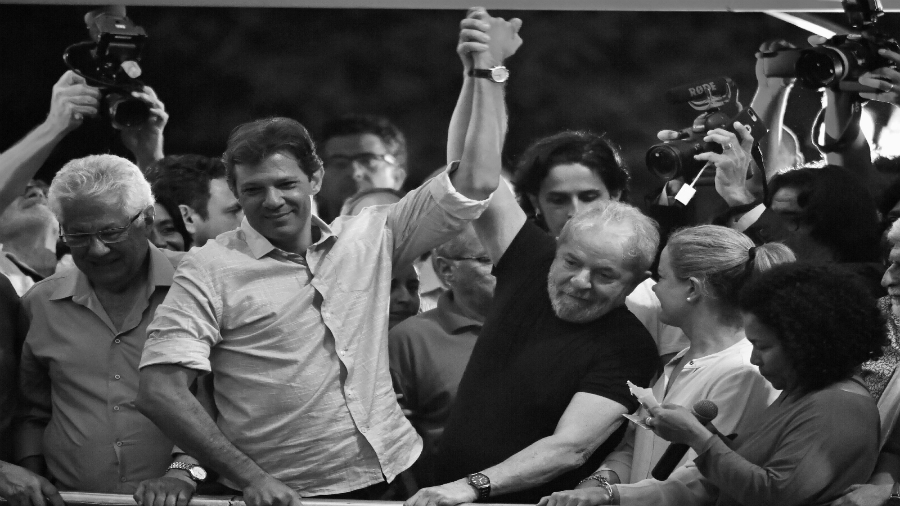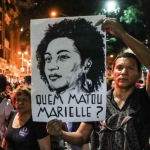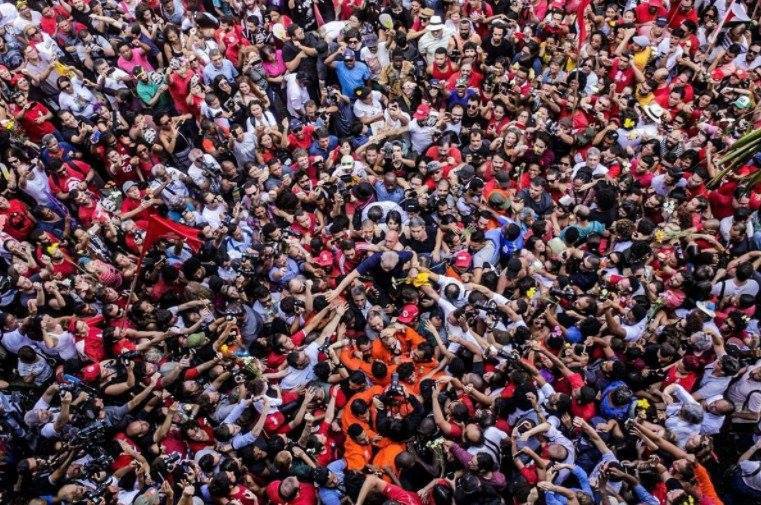Fernando Haddad: “Lula es un parteaguas en la historia de Brasil” // La Tinta

El ex presidente Luiz Inácio Lula da Silva, preso político hace 158 días, “pasó el bastón” a Fernando Haddad y a Manuela D’Ávila en la disputa electoral por la presidencia. El ex ministro de la Educación entre 2005 y 2012, y ex alcalde de la ciudad de São Paulo entre 2013 y 2017, sustituirá a Lula como candidato a presidente, mientras Manuela D’Ávila asumirá como candidata a vicepresidenta en la lista electoral del Partido de los Trabajadores (PT).
El anuncio fue realizado el martes por la tarde frente a la sede de la Policía Federal, en la ciudad de Curitiba, donde el ex mandatario está detenido. Lula escribió una carta dirigida al pueblo brasileño, leída por el abogado Luiz Eduardo Greenhalgh, uno de los fundadores del PT, donde explica la decisión de designar al ex alcalde de São Paulo para la disputa,destacando la actuación de Haddad como ex ministro de Educación y las políticas públicas que permitieron el acceso de cuatro millones de estudiantes a la educación superior durante su gobierno y el de Dilma Rousseff.
“En verdad, han prohibido que el pueblo brasileño vote libremente para cambiar la triste realidad del país. Nunca he aceptado la injusticia ni la voy a aceptar (…). Es frente a estas circunstancias que tengo que tomar una decisión, en el plazo que se me ha impuesto arbitrariamente. Estoy indicando al PT y a la coalición ‘El pueblo feliz de nuevo’ la sustitución de mi candidatura por la del compañero Fernando Haddad, que, hasta este momento, ha desempeñado con extrema lealtad la posición de candidato a vicepresidente (…). Si quieren acallar nuestra voz y derrotar nuestro proyecto para el país, están muy equivocados. Nosotros seguimos vivos, en el corazón y en la memoria del pueblo. Y nuestro nombre ahora es Haddad”, afirmó Lula en su carta.
Al final del documento, el ex mandatario pide a sus seguidores que voten por Haddad y por los candidatos a gobernadores, senadores y diputados del Partido de los Trabajadores.
Haddad dio un discurso en Curitiba donde afirmó que “no desistirá de Brasil y que recibió de Lula la misión de erguirlo”. El actual candidato también reiteró la importancia de Lula para la historia del país.
“No vamos a aceptar, vamos a erguirlo nuevamente, somos brasileños, tenemos la misión hacer que el pueblo recuerde los buenos días que hemos vivido. Siento el dolor de muchos brasileños y brasileñas que van a recibir hoy la noticia que no podrán votar por el candidato que nos gustaría ver subir la rampa del Palacio del Planalto y gobernar el país a partir del 1 de enero. Es un dolor sentido por el pueblo más querido de este país, que sabe lo que representaron nuestros gobiernos, desde el punto de vista de la historia, una historia tan cruel, injusta. Nuestro Lula representó y representa un parteaguas en la historia de Brasil, antes y un después. Lula salió de las entrañas de nuestro pueblo”, dijo.
El Comité de Derechos Humanos de la ONU reafirmó por tercera vez, el pasado lunes, la decisión de asegurar los derechos políticos de Lula como candidato. La presidenta del PT, Gleisi Hoffmann, fue la responsable por presentar la decisión de la candidatura de Haddad. En su discurso, Hoffmann señaló que el PT, los partidos de la lista y los movimientos partidarios lucharon hasta el último momento por el derecho de Lula a ser candidato.
“Quienes participan en esta vigilia acompañan el presidente y conocen todos los enfrentamientos que estamos haciendo. Aunque, desde la cárcel, Lula lidera las encuestas de opinión. Luchamos mucho para hacer de Lula nuestro candidato a presidente. El 15 de agosto, al enfrentar todo ese proyecto, inscribimos la candidatura de Lula en una celebración muy linda en Brasilia. Siempre hemos creído que su candidatura es esencial para sacar el país de la crisis. Es muy triste ver a la democracia brasileña, si es que podemos hablar que vivimos en una, en este proceso. Aceptamos el desafío del presidente Lula, de no dejar al pueblo brasileño sin alternativa para su lucha”, afirmó antes de anunciar la candidatura de Haddad en la coalición “El pueblo feliz de nuevo”.
Lula lideraba todas las encuestas de opinión sobre las elecciones de octubre, pero fue impedido de participar en ellas debido a una decisión del Tribunal Superior Electoral (TSE).
El Partido de los Trabajadores mantuvo el nombre de Lula como candidato hasta el último momento posible en el calendario electoral de 2018.
El actual candidato por el Partido de los Trabajadores tuvo el mayor crecimiento en el último sondeo: subió cinco puntos porcentuales y alcanzó el 9 por ciento de la intención de voto. En el sondeo anterior, aún se presentaba al ex ministro de la Educación en un cuestionario posterior al oficial, que presentaba a Lula como candidato.
El PT apuesta ahora en la transferencia de voto de Lula a Haddad. El sondeo del Instituto Datafolha también señala que el 33 por ciento del electorado votaría por el candidato de Lula y el 16 por ciento que “podría votarlo”.
Por Rute Pina y Júlia Dolce para Brasil de Fato / Traducción: Luiza Mançano







